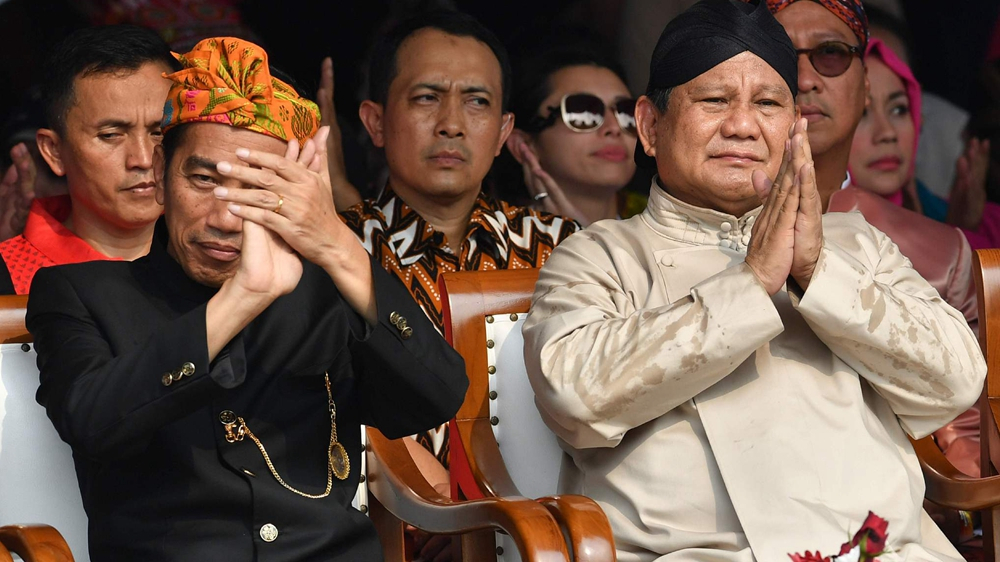
Economy
17:13, 15-Apr-2019
Infrastructure spending at the center of Indonesia election
CGTN

For Indonesians stuck in traffic in the world's most congested city, sitting in a standstill in Jakarta offers plenty of time to reflect on where the country has come from in recent decades and where it is going, ahead of this week's presidential election.
President Joko Widodo, seeking a second five-year term in Wednesday's poll, finally launched the capital's first subway line in March this year, a 16-kilometer section of track that makes up part of a mass rapid transit network which has been under discussion since the 1980s.
Line two is currently under construction – but won't be operational until at least 2025.
Above ground, commuters continue to sit in traffic where the average speed is 10 kilometers per hour. The average Jakartan spends 22 days per year sitting in traffic, according to a 2017 study by Uber.
A report by Euromonitor published last year found that by 2030, Jakarta will overtake Tokyo as the largest city in the world in terms of population. But without the right infrastructure in place, Indonesia will struggle to let the city's 35.6 million residents reach their full economic potential.
Beyond the capital, Southeast Asia's most populous nation is spread out across more than 17,000 islands in a country rich in resources but lacking in transport, telecommunications and other essential infrastructure.
Despite impressive economic growth that has halved poverty, 9.8 percent of Indonesians still live below the poverty line, while more than 20 percent are at risk of falling into poverty. Poor healthcare access coupled with frequent earthquakes, volcanic eruptions and other natural disasters compound the challenges facing the country's leaders.

Indonesian President Joko Widodo. /VCG Photo
Indonesian President Joko Widodo. /VCG Photo
Widodo, known as Jokowi, realizes what is at stake when it comes to Indonesia's infrastructure demands. He came to power in 2014 on the promise of 340 billion U.S. dollars' worth of infrastructure investment. Airports, bridges and ports have been built and upgraded, with Jokowi welcoming foreign investment with open arms.
The Jakarta MRT was one of several major projects backed by Japan, but the biggest emerging player in Indonesia's infrastructure boom is China.
In October 2013, Chinese President Xi Jinping proposed the 21st century Maritime Silk Road for the first time in a speech made in Indonesia. Since then the Southeast Asian nation has embraced Chinese investment, with China Indonesia's third largest source of FDI.
Some 2.3 billion U.S. dollars' worth of Chinese FDI has gone into projects including airports, industrial parks and a high-speed rail link between Jakarta and Bandung, where construction work got underway last month.
Investment over the past five years has seen China become the biggest source of foreign tourists for Indonesia, while bilateral trade in 2018 hit 72.6 billion U.S. dollars, a 23.5 percent jump on the previous year.
Last month Indonesia's Maritime Affairs Minister Luhut Pandjaitan told media that the country would put forward 28 proposals to Chinese investors to compliment the Belt and Road Initiative, including seaport developments, power plants and tourism projects.
While Jokowi is keen to continue leading the push for greater infrastructure investment through closer ties with China's Belt and Road and other international partners, his presidential challenger, Prabowo Subianto, is looking to push future development in another direction.
Subianto, a former military general who lost to Jokowi in the 2014 vote, has said the president's focus on infrastructure investment has seen debt balloon, while flooding the country with foreign equipment and products.
Amid speculation that Subianto would look to review Belt and Road projects if he came to power, a pre-election debate saw Jokowi's rival praise China as a model for economic development, as he told crowds “We have to take an example from China, which was able to get out of poverty in 40 years.”
Vowing to continue investing in infrastructure, particularly in areas outside of Jakarta, Jokowi is likely to secure victory in Wednesday's vote, with an opinion poll conducted last week by Charta Politika giving the incumbent 55.7 percent of the vote, far ahead of Subianto on 38.8 percent.

SITEMAP
Copyright © 2018 CGTN. Beijing ICP prepared NO.16065310-3
Copyright © 2018 CGTN. Beijing ICP prepared NO.16065310-3